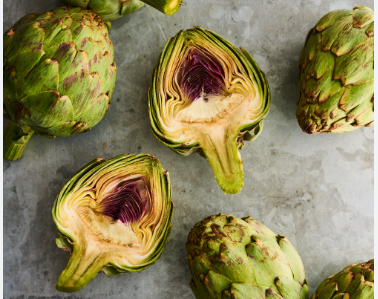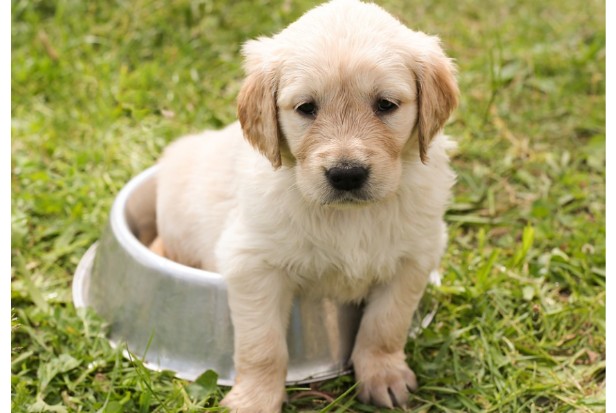This post will discuss whether dogs can eat artichokes and what are the benifits and risks of artichokes for dogs.
For humans, summertime isn’t complete without fresh artichokes, but are they safe for dogs as well? Yes, but only if you take care to avoid choking hazards.
Table of Contents
What Are Artichokes?
Contrary to popular belief, artichokes are actually a type of thistle plant and not a vegetable. The globe-shaped flower bud, which is grown before the flower blooms and becomes tough and inedible afterward, is the only part of this thistle plant that can be consumed.
People often confuse these “globe” artichokes with Jerusalem artichokes, which are distinct. The edible portion (the tuber or root) of a particular type of sunflower is known as a Jerusalem artichoke.
Can Dogs Eat Artichokes?
Artichokes are safe for your dog to eat, in fact. Any portion of an artichoke, including the leaves, hearts, and stem, can be fed to your dog and provide them with nutrition. The fact that artichokes can pose a choking hazard is a bigger problem, especially for small dogs. Artichoke leaves are difficult to decompose due to their high fiber content. They can obstruct your dog’s windpipe or digestive tract, which poses serious health risks. That significant risk is completely eliminated if you serve your dog artichokes in bite-sized pieces.
Also, be careful not to give your dog canned artichokes that have been seasoned or dipped in oil. The unhealthy fat content of the oils can contribute to weight gain, and some seasonings can upset your stomach. Since many dogs are lactose intolerant, cream cheese-based artichoke dip can cause digestive problems as well as weight gain. Both raw and cooked artichokes are acceptable. Usually, adding a whole artichoke to your dog’s bowl of food after steaming it in water and chopping it into small pieces is the best option.

Health Benefits of Artichokes for Dogs
The thistle family includes artichokes. Contrary to popular belief, they are not to be confused with Jerusalem artichokes, also known as sunchokes, which are a part of the sunflower plant and are safe for a dog’s body. Here are some nutritional attributes that make artichokes good for dogs:
- Dietary fiber: Dietary fiber, which is abundant in artichokes and is beneficial for the digestive system, can relieve constipation. Fiber can also make your dog feel satisfied after a meal.
- Vitamins and minerals: Niacin, potassium, folic acid, and vitamin C are all present in abundance in artichokes. The minerals magnesium, phosphorus, zinc, and vitamin K are also present in trace amounts. Niacin and folic acid, two B vitamins found in artichokes, help your dog’s coat and promote the production of red blood cells.
- Low in fat and cholesterol-free: Low in fat and cholesterol, artichokes are a healthy food. (Notably, dogs should not be given marinated artichokes or artichoke dip because they contain high levels of these lipids.)
- Antioxidants: Artichokes have antioxidants like many vegetables do, including vitamin C. Antioxidants help to boost the immune system and remove free radicals from the bloodstream.
Risks of Feeding Your Dogs Artichokes
Artichokes are generally safe to give to dogs. You need to watch out for two main risks.
- Choking hazards: Artichoke leaves can be abrasive and challenging to chew. They are easily capable of choking or blocking the intestines. Only serve artichokes to your dog cut into pieces, and emphasize the artichoke heart and stem because they are the most tender parts.
- Fats, seasonings, and preservatives: Artichoke dip and marinated artichokes are unhealthy for dogs because they contain oils, seasonings, and preservatives. It’s usually best to only give your dog raw or cooked artichokes steamed in water.
How to Include Artichokes into Your Dog’s Diet
It’s probably best to stay away from giving your dog artichokes that have been preserved in oils and that have seasonings like salt, onions, and garlic (onions and garlic are toxic to dogs) that are likely to be harmful.
The best thing to do if you want to feed your dog artichokes is to make them yourself.
Although it is commonly believed, artichokes are not difficult to prepare. Trimming the globe’s inedible parts is necessary, but it’s not as challenging as you might think.
Cooking is required after trimming the artichoke globe. Steamed artichokes can be cooked for 30 to 40 minutes, or they can be simmered in boiling water for 15 to 30 minutes.
Once cooked, chop the food into small, dog-friendly bite-sized chunks. But keep in mind, don’t add salt or other seasonings!
Summary: Don’t Overfeed Them
Can a dog consume an artichoke?
I believe it has been established that dogs can eat artichokes. As long as they haven’t been preserved in oils or seasoned with potentially dangerous ingredients, artichokes have a number of potential health advantages for dogs.
Never forget, however, that if you overfeed your dog, even healthy treats can be bad for their health.
Read more: Can Dogs Eat Chorizo?-The Answer Is NO!
Can Dogs Eat Couscous? Is It Safe Or Not?
Can Chickens Eat Sweet Potatoes? What You Need To Know
Can Dogs Have Blue Cheese? Is Cheese Safe For My Dog?
Can Dogs Have Hummus? Is It Safe For My Dog
Can Dogs Eat Cornbread? Everything You Need To Know
FAQs
How Much Artichoke Can a Dog Eat?
Treats like artichokes can be part of a dog’s daily diet, but you shouldn’t feed them more than what they need in terms of calories. This article on the AKC website says that “treats should not make up more than 10 percent of your dog’s diet”.
Can Dogs Have Spinach and Artichokes?
Spinach and Artichoke – This is a safe food for dogs. Spinach and broccoli are both safe for dogs to consume in moderation. Cheese and Spinach: Keep an eye out for lactose intolerance symptoms.
Can Dogs Eat Artichoke Dip?
An upset stomach, nausea, vomiting, or diarrhea might follow. Seasonings like garlic powder, which can be poisonous to dogs, are also present in artichoke dips. So it’s best to avoid giving your dog artichoke dip.
What Vegetables Cannot Be Fed to Dogs?
Onions, leeks, and chives are part of a family of plants called Allium is poisonous to the majority of animals, particularly cats. Red blood cell rupture, nausea, vomiting, diarrhea, and stomach pain can all result from giving your dog onions.
